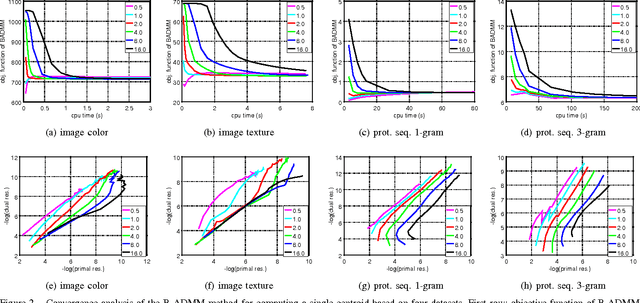Panruo Wu
Fast Discrete Distribution Clustering Using Wasserstein Barycenter with Sparse Support
Jan 09, 2017



Abstract:In a variety of research areas, the weighted bag of vectors and the histogram are widely used descriptors for complex objects. Both can be expressed as discrete distributions. D2-clustering pursues the minimum total within-cluster variation for a set of discrete distributions subject to the Kantorovich-Wasserstein metric. D2-clustering has a severe scalability issue, the bottleneck being the computation of a centroid distribution, called Wasserstein barycenter, that minimizes its sum of squared distances to the cluster members. In this paper, we develop a modified Bregman ADMM approach for computing the approximate discrete Wasserstein barycenter of large clusters. In the case when the support points of the barycenters are unknown and have low cardinality, our method achieves high accuracy empirically at a much reduced computational cost. The strengths and weaknesses of our method and its alternatives are examined through experiments, and we recommend scenarios for their respective usage. Moreover, we develop both serial and parallelized versions of the algorithm. By experimenting with large-scale data, we demonstrate the computational efficiency of the new methods and investigate their convergence properties and numerical stability. The clustering results obtained on several datasets in different domains are highly competitive in comparison with some widely used methods in the corresponding areas.
 Add to Chrome
Add to Chrome Add to Firefox
Add to Firefox Add to Edge
Add to Edge